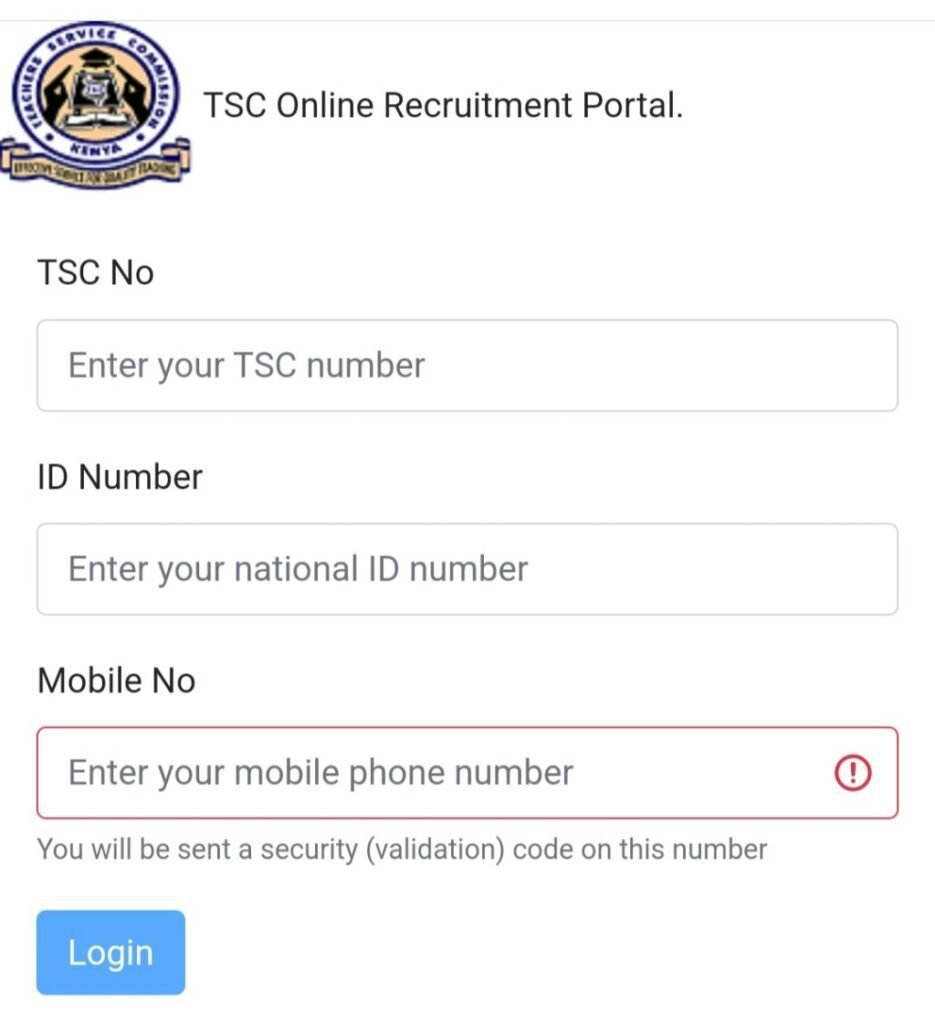Teachers Service Commission (TSC) Advertises Vacancies for Over 46,000 Teachers in Kenya


Introduction to TSC Teacher Vacancies
The Teachers Service Commission (TSC) in Kenya plays a crucial role in the recruitment and management of teachers, ensuring that the education system meets its standards and caters to the needs of learners across the country. Established by the Kenyan Constitution, the TSC is mandated to register, enlist, and manage teachers, thereby upholding the quality of education. Recently, the TSC made an impactful announcement regarding the availability of over 46,000 teaching vacancies, which marks a significant opportunity within the education sector.
This surge in teacher vacancies is particularly vital as it comes at a time when the government is emphasizing the improvement and expansion of the education system, particularly within the framework of junior secondary school (JSS) education. With the recent introduction of the Competency-Based Curriculum (CBC) in Kenya, there is an urgent need for qualified teachers to facilitate effective learning and ensure the successful implementation of these educational reforms. The TSC vacancies thus represent not just job opportunities but also a chance for aspiring educators to contribute meaningfully to the future of Kenya’s youth.
The influx of job openings also signals the government’s commitment to addressing teacher shortages, which have been a persistent challenge. By filling these positions, the TSC aims to enhance the quality of instruction and learning experiences in JSS, ultimately supporting the holistic development of students. Furthermore, this recruitment initiative will help balance the teacher-student ratio, ensuring that each learner receives adequate attention and support throughout their educational journey.
In conclusion, the recent announcement by the Teachers Service Commission regarding over 46,000 teacher vacancies holds significant implications for the education landscape in Kenya. This initiative is imperative to not only bolster the teaching workforce but also to enhance the quality of education in response to the evolving curriculum and learner needs.
Eligibility Criteria for Applicants
In order to apply for the recently advertised vacancies by the Teachers Service Commission (TSC) in Kenya, prospective applicants must adhere to specific eligibility criteria designed to ensure that only qualified individuals enter the teaching profession. First and foremost, candidates must be citizens of Kenya. This requirement emphasizes the TSC’s commitment to hiring individuals who have a vested interest in the education and development of the country’s youth.
Moreover, registration as a teacher with the TSC is mandatory. Applicants must provide evidence of their registration status, as this demonstrates their compliance with professional standards set by the commission. To obtain registration, candidates must have completed a recognized teacher training program that culminates in a certification. This educational background is crucial, as it assures that applicants have the necessary pedagogical skills and knowledge to effectively facilitate learning in classrooms.
In addition to citizenship and registration, various documents are required during the application process. Candidates must present their academic certificates, which serve as proof of their educational qualifications. These certificates should reflect the successful completion of primary, secondary, and tertiary education, as applicable. Furthermore, identity verification is essential; applicants must submit a copy of their National Identification Card or any other relevant identification document to confirm their identity.
Additionally, it is imperative for candidates to complete and submit the appropriate application forms as stipulated by the TSC. These forms may include declarations of any pertinent information relevant to the eligibility criteria, and incomplete or inaccurate documentation could hinder the application process. By adhering to these comprehensive requirements, prospective teachers can ensure their applications meet the TSC’s standards, advancing their chances of securing a teaching position in Kenya.
Significance of the Recruitment Drive
Apply here now
The recent announcement by the Teachers Service Commission (TSC) regarding the recruitment of over 46,000 teachers in Kenya holds critical importance for both the education sector and the broader community. This recruitment drive comes at a pivotal time when the educational framework is adapting to support the newly established Junior Secondary Schools (JSS). As these institutions expand, the requirement for qualified educators becomes paramount to ensure that students receive quality education.
One of the primary implications of this extensive recruitment is the potential enhancement of teaching standards throughout the country. By bringing in a substantial number of qualified teachers, the TSC is not only addressing the need for more educators but is also raising the bar for educational outcomes. Well-trained teachers are instrumental in delivering quality instruction, fostering an environment that encourages student engagement and success. The introduction of qualified personnel into classrooms can significantly improve learning experiences and academic performance, leading to better outcomes for students.
Furthermore, this recruitment drive has the potential to address teacher shortages that exist in various regions, particularly in rural and underserved areas. Many communities have been grappling with the challenges posed by inadequate teaching staff, which hampers the educational progress of students. By allocating resources to fill these vacancies, the TSC demonstrates a commitment to equitable access to quality education, regardless of geographic location. This move is expected to contribute to a more balanced distribution of educational resources, ultimately reducing disparities across different regions.
In summary, the significance of recruiting 46,000 teachers cannot be understated. It has far-reaching implications for the quality of education, the professional development of educators, and the overall educational landscape in Kenya. The TSC’s initiative is a step towards addressing current challenges within the sector, while also paving the way for a brighter future for both students and communities alike.
Application Process Explained
The application process for the teaching vacancies advertised by the Teachers Service Commission (TSC) in Kenya is designed to ensure a systematic and fair selection of candidates. To begin, interested applicants must access the official TSC website to find detailed information about the available vacancies and eligibility criteria. It is essential to thoroughly read the job descriptions to understand what is required for each teaching position.
Once you have identified a suitable vacancy, the next step involves filling out the online application form. This form can typically be found on the TSC’s careers section. While completing this form, it is crucial to provide accurate information including personal details, educational qualifications, and relevant teaching experience. Misrepresentation of information may lead to disqualification.
After filling out the application form, candidates are required to submit their application along with the necessary documentation. This may include copies of academic certificates, a National Identity Card, and any other relevant supporting documents. It is recommended to convert all documents to PDF format to ensure compatibility and prevent any formatting issues during submission.
The TSC has set specific deadlines for applications, and it is vital to adhere to these timelines. Typically, the commission will announce the deadline date on their official website, and late submissions are generally not accepted. Therefore, candidates should plan their applications accordingly to avoid missing out on this opportunity.
Furthermore, candidates are encouraged to keep a copy of their submission acknowledgment, as this may be requested during the interview process. To enhance the likelihood of a successful application, applicants should ensure that all information is clear, concise, and free of errors. Careful preparation and adherence to the outlined procedures will significantly improve the chances of being shortlisted for an interview.
Kenya’s Education System Changes and JSS Employment
In recent years, Kenya’s education system has undergone significant reforms aimed at enhancing learning outcomes and responding to the dynamic needs of the society. One of the most notable changes is the introduction of Junior Secondary Schools (JSS), which forms a crucial component of the Competency-Based Curriculum (CBC). This initiative is intended to bridge the gap between primary and secondary education, providing learners with a smoother transition that emphasizes critical thinking, creativity, and practical skills.
However, the introduction of JSS has not been without its challenges, particularly in terms of hiring qualified educators. The employment of JSS teachers has been a subject of ongoing dialogues among stakeholders, including the Teachers Service Commission (TSC), education policymakers, and teacher unions. Concerns regarding the qualifications of teachers, allocation of resources, and infrastructural capacity have complicated the seamless implementation of JSS. Many JSS teachers have expressed uncertainty about their job security, with some not fully recognized under the existing employment frameworks.
The drive to hire over 46,000 teachers, as recently advertised by the TSC, serves to address the pressing need for qualified educators in Junior Secondary Schools. This hiring initiative is a response to the urgent demand for teaching staff who are well-versed in the learning goals set out under the new curriculum. With this undertaking, the TSC aspires to not only fill the current gaps in staffing but also bolster the quality of education being delivered at the JSS level.
The hiring process is pivotal as it points towards a broader agenda of professionalizing teaching in this new educational phase. It is crucial for the TSC to collaborate effectively with educational stakeholders, ensuring that employment policies are transparent and responsive to the realities faced by JSS teachers. As these dialogues continue, the ultimate aim remains focused on creating a stable and well-supported environment for both teachers and students within the changing educational landscape of Kenya.
Supporting Documents Required
When applying for the positions advertised by the Teachers Service Commission (TSC) in Kenya, it is imperative for potential candidates to prepare and submit an array of supporting documents. This documentation is essential in verifying the qualifications and credentials of each applicant, ensuring the application process remains clear and efficient. In this section, we will outline the key documents that must be included with the application.
Firstly, applicants are required to complete the GP69 form. This is a standard application form that collects personal information, educational background, and professional qualifications. It is crucial that this form is filled out accurately to reflect the individual’s qualifications and experience in the education sector.
Another necessary document is the Kenya Revenue Authority (KRA) Personal Identification Number (PIN), which is a unique identifier for tax purposes in Kenya. Proving tax compliance is an important aspect of the application process, as it demonstrates the applicant’s compliance with government regulations.
Additionally, applicants must provide a certificate of good conduct. This certificate, issued by the Directorate of Criminal Investigations, verifies that the individual has no criminal record. It is particularly significant for positions within the education system, where the safety and well-being of students are paramount.
Other supporting documents may include copies of academic certificates, including degree and teaching diplomas, as well as any relevant professional development certifications. Recommendations from previous employers or supervisors can also strengthen an application, highlighting the applicant’s professional skills and character.
Overall, it is advisable for potential teachers to meticulously prepare the required documents to enhance their chances of a successful application to the TSC. Ensuring that all paperwork is organized and complete will facilitate a smoother review process and contribute to the timely evaluation of applications.
Impacts of Employment on JSS and Communities
The recent announcement by the Teachers Service Commission (TSC) regarding the recruitment of over 46,000 teachers for junior secondary schools (JSS) in Kenya carries significant implications for both educational quality and community development. With the influx of new educators, the quality of education is expected to improve markedly. Adequate staffing levels in JSS are crucial for reducing teacher-to-student ratios, which in turn fosters more personalized attention and support for each learner, ultimately leading to better academic performance.
Moreover, the hiring of new teachers has a direct impact on student outcomes. Research consistently shows that students perform better when taught by qualified and sufficient teaching staff. An increase in the number of educators can lead to enhanced curriculum delivery, increased engagement in classroom activities, and improved management of diverse learning needs. Consequently, these factors contribute positively to the overall success rates of students, laying a solid foundation for their future academic and professional endeavors.
Beyond the immediate classroom effects, the recruitment of teachers also promotes broader community development. Newly employed educators become integral members of their local communities, often taking part in various outreach initiatives and local events. This involvement fosters stronger relationships between schools and the surrounding communities, enhancing collaboration and resource sharing. Schools can benefit from local input and support for educational programs, which creates a more holistic educational environment.
Furthermore, a higher employment rate among qualified teachers brings economic benefits to the communities as well. Teachers often become consumers of local goods and services, stimulating economic growth. Families relocating to areas with newly staffed schools can bolster local economies, creating jobs and investing in community development initiatives. The overall impact of hiring new educators is thus twofold: it elevates student outcomes and enriches community welfare, paving the way for a brighter future within the educational landscape of Kenya.
TSC’s Role and Responsibilities
The Teachers Service Commission (TSC) is a constitutional body established under Article 237 of the Kenyan Constitution. Its primary mandate is to manage the recruitment, registration, training, and discipline of teachers in the country. The TSC plays a crucial role in ensuring that qualified personnel are deployed to various educational institutions, thus enhancing the quality of education in Kenya. The structure of the commission includes a chairperson, vice-chairperson, and a team of commissioners appointed by the President, alongside a professional secretariat. This organized framework enables TSC to effectively execute its responsibilities and maintain a high standard within the teaching profession.
One of the key responsibilities of the TSC is the formulation of policies and guidelines that govern teacher employment. This includes setting up clear criteria for recruitment, which ensures that only qualified individuals are selected to fill teaching vacancies. Recently, the TSC announced a significant number of vacancies, indicating a continued demand for educators in various regions. This comprehensive recruitment strategy not only aims to fill existing gaps but also supports the government’s efforts to expand access to education in underserved areas.
Additionally, the TSC oversees the professional development of teachers. It conducts periodic training and workshops aimed at enhancing the skills and competencies of educators. This commitment to continuous professional development is vital for adapting to the evolving educational landscape, including the integration of technology and new teaching methodologies. By focusing on teacher training and professional growth, the TSC contributes to improved educational outcomes for students across the nation.
In summary, the Teachers Service Commission serves as a cornerstone in the governance of the Kenyan education system. Its roles encompass teacher recruitment, training, and the establishment of standards that contribute to the overall efficacy of educational delivery, thus safeguarding the future of education in Kenya.
Conclusion and Call to Action
In summary, the Teachers Service Commission (TSC) has announced a significant opportunity for individuals seeking to advance their careers in education. With over 46,000 vacancies advertised for teachers across various disciplines, this initiative is aimed at enhancing the quality of education in Kenya. The recruitment drive not only addresses the growing need for qualified educators but also aligns with the government’s efforts to improve education access and standards nationwide.
Eligible teachers are encouraged to seize this opportunity and submit their applications before the specified deadline. The roles available encompass a wide range of teaching positions, ensuring that many applicants will find suitable placements in both urban and rural settings. This initiative is crucial in bridging the gap in teacher shortages, thus playing a vital role in shaping the future of education in Kenya.
As aspiring educators consider their applications, it is essential to focus on the requirements listed and prepare the necessary documentation. The application process provides a platform for qualified individuals to demonstrate their capabilities and passion for teaching. Moreover, this recruitment drive represents a chance for teachers to contribute significantly to the educational landscape, uplifting communities and fostering a culture of learning.
To ensure a smooth application experience, candidates should regularly check the TSC official website for updates and further instructions regarding the application process. Time is of the essence, and it is advisable for eligible teachers to act promptly and prepare their applications meticulously. This is an opportunity to make a meaningful impact and fulfill one’s career aspirations. The future of education in Kenya is bright, and with the right candidates, it will continue to thrive.






